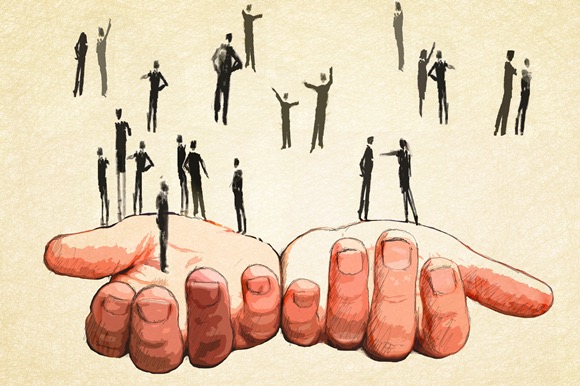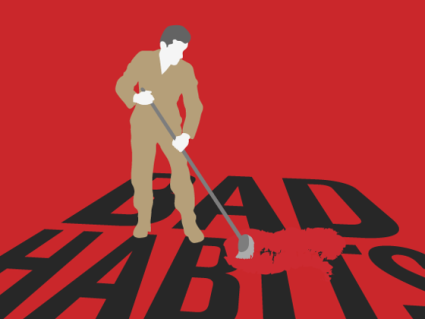When your career is in the dumps, the typical advice is, “Don’t worry and stay positive.”
While this idea looks nice on paper it’s not going to do much when you have bills to pay, mouths to feed and your life’s purpose seems partly lost.
There are common traps that people in this situation fall into. They are:
– Depending on someone else to find them their next career
– Thinking they can just work through it
– Pretending everything is okay when it’s not
Hitting a major career crisis is messed up. Standing still and hoping that everything will be okay will get you nowhere. You’re in control and you’re going to need all the energy you have to get through it.
Right now, my career is down the drain. Everything I have worked for has begun imploding through a series of unrelated events such as restructures, people moving on, lack of understanding, shifts in the market and a change in focus.
These are the 13 things I’ve learned to do in a career crisis:
1. Quit pointing the finger.
Blaming the company, senior leaders, the strategy or any other lame excuse won’t achieve anything. You’re in this career crisis mostly because of your own actions. In my case, I stayed in my current career too long because I was having fun and loved the people I was working with.
I knew it was time to move on six months ago and I ignored the warning signs – that’s a failure on my part right there. I had two choices: blame the company or pull my socks up and move on. I chose the latter. The blame game gets you nowhere. If you hate your current career, then leave.
It’s very tempting to blame the company and point the finger at people you work with who have failed you (in your eyes). The fantasy seems good but the reality is BS.
“Quit pointing the finger and accept what’s happening is your fault. Only you can change your career situation”
2. Get off the Titanic.
“Rose, we have to leave the ship or we will die in the freezing cold water!”
 A career crisis that you know is forcing you to move on must be thought about like the Titanic. If your perception of reality is that the ship is sinking and there are leaky holes everywhere, then waiting around is going to force your ass into the freezing cold water.
A career crisis that you know is forcing you to move on must be thought about like the Titanic. If your perception of reality is that the ship is sinking and there are leaky holes everywhere, then waiting around is going to force your ass into the freezing cold water.
Changing career takes a long time from the moment you make the decision – which is often delayed because of procrastination. If you know the ship is sinking – like I currently do – then get out of there faster than Jumping Jack Flash.
Grab your torch, grab your belonging’s, kiss your colleagues on the cheek and then run as fast as you can. Hanging around while the ship is sinking will only make your career crisis worse.
While I tell you this phenomenal advice, I didn’t follow it. Thank god I survived the shipwreck and can deliver this advice to you.
3. No one is going to save you – save yourself.
I somehow thought that a magic fairy was going to swoop in and save my ass because you know, I’m Tim Denning after all.
 This was wishful thinking that screwed me even more.
This was wishful thinking that screwed me even more.
No one is saving your ass. That career you’ve worked hard for may be in ruins and only you can fix it. In my situation, I found 90% of those around me only wanted to save themselves. No point dwelling on this fact it’s just the reality of these career situations.
Again, we can be bitter and pissed off or accept that it’s in our human nature to save ourselves first. Waiting around and hoping for a lifeline will push you further into despair.
“The moment you realize that you are responsible for everything that happens in your career is the moment everything changes”
4. The 10% that do want to help.
The good news: there will always be 10% of those around you who do want to help. You must do the following:
– Worship these kind people
– Show your gratitude every time (I literally do it in every email and phone call)
– Follow up with them
– Let them know you will be there for them when they need the same help

I’ve had some ripper colleagues bend over backwards to help me during this difficult time. I even had several customers, partners, accountants, friends and competitors (go figure!) chip in.
It’s this network of people that you should focus on. Every conversation I’ve had and every favor that’s been done has been met with a promise of returning the lifeline that has been given. I’ve told them my gratitude over and over, so they understand how important its been.
I’ve written customized emails and text messages to express my gratitude. NEVER TAKE THE 10% THAT WANT TO HELP YOU FOR GRANTED! These kind people owe you nothing. Remember that.
5. There’s always a turning point.
I experienced this back in 2011 when I left a company I started with my brother. It was a horrible time and I thought that because of all the success I’d had, I was entitled to assistance. I waited around hoping for someone to give me some magic career opportunity.
The phone never rang. I became more and more negative which pushed people further away. Thanks to a Tony Robbins audiotape, late one night I got up off my butt and went for a walk with this new audiotape playing on my 2009 iPod.
That night, I walked around my entire suburb for hours listening to Tony Robbins. I did every exercise he said including the deep breathing and shouting out loud. People in the streets thought I was off my head on drugs.
 This one turning point changed everything. I decided that for the next few years I would eat dirt. I’d relearn the skill of sales; I’d become positive again; I’d embrace personal development and I’d change my diet to create energy.
This one turning point changed everything. I decided that for the next few years I would eat dirt. I’d relearn the skill of sales; I’d become positive again; I’d embrace personal development and I’d change my diet to create energy.
I was so broke at the time that it took me two more years before I could save up enough money to attend a Tony Robbins event which helped me even more.
This career crisis became the foundation of all the success that followed.
6. Back to old success habits.
There were habits that made you successful before that you’ve stopped doing. What were they?
When my recent career crisis hit me like a brick in the face, I went back to my 2011 survival mode – only this time I was prepared.
“People saw me at work with my 2009 iPod which now looks like a relic out of Indiana Jones”
I’ve put the Tony Robbins tapes back in repeat mode. The tapes helped me before and they can help again. The same is true for you. You’ve had success habits before that have got you out of a rough patch. In times of crisis, using them again can be very helpful.
7. In a crisis, there is opportunity.
A career crisis can often be a brilliant opportunity in disguise. We get stuck with our habits and being comfortable. Having to deal with a career crisis can force you to take action and execute.
For example, I wrote down what I wanted going forward. That exercise caused an epiphany: I only want to work four days a week from now on. I decided I’m happy to sacrifice money for time so I can do what I love (writing these words for you).
Changes in company structures and people within a business may force you into a career crisis but it can also be filled with luscious blue sky. People moving around means that you could move up or even to an opportunity that is more aligned with your passion.
Don’t see a crisis as a bad thing; use it to propel your career forward.
This shift in thinking alone can change your work life entirely.
8. A career crisis could make all of your colleague’s negative.
This happened to me. There were lunchtime whinging sessions, random phone calls, emails – you name it. In one of the calls with my colleagues, things turned sour. I immediately hung up from the call. I then got SMS’s saying “Did you drop off the phone?”
My answer was “Yes and I will not be re-joining.” Their response was “We understand.”
I’m not putting up with any excess negativity. The burden of a career crisis is enough to deal with and stacking more negativity will weigh you down. The default human response is negativity so when a career crisis happens (especially one that affects your colleagues), you have to get disciplined.
Set some boundaries and avoid the negativity as much as humanly possible. You’ll piss people off (like I did) but it’s worth every bit of disgust your colleagues may have with you.
9. Options are like a cat with 9 lives.
In a career crisis, the best thing you can have is options. The moment my own career went into meltdown I rang every recruiter I knew. I pre-warned them months in advance. When my fate was set in stone, I sent them my resume and told them I was available.
 I also asked them how I could assist them in return and offered my knowledge of social media as a bargaining chip. These recruiters give you options so that when you are faced with difficult decisions, you don’t have to accept a career opportunity that you don’t 100% want.
I also asked them how I could assist them in return and offered my knowledge of social media as a bargaining chip. These recruiters give you options so that when you are faced with difficult decisions, you don’t have to accept a career opportunity that you don’t 100% want.
Having no options will force you to choose the easy way out which will leave you even more frustrated in the long run. A career crisis is a chance to do something new and the more prospects you have, the better it feels to assess each one.
10. Dust off your address book.
Metaphorically of course because none of us carry around little books with names and phone numbers anymore. Start ringing everyone you know and telling them that you are open to new career opportunities. Keep the tone positive and avoid talking down your current company.
Reconnect with literally anyone you know. The next opportunity could come from the strangest of places. One of the career prospects I’m assessing right now that is at the top of my list was referred to me by someone I met once who sent me a text, and who I can’t even remember meeting.
I’m not sure how they got my number or even knew I was looking. Frankly, I don’t even care. Your network can help during these moments of disaster but you have to put in the work and call people. Again, sitting around feeling sorry for yourself will get you nowhere.
11. Avoid coups.
They never work out well. Enough said.
12. Never expect immediate results.
From the moment you decide to change up your career, it’s probably going to take 3-6 months minimum. Patience is key. Nothing in your career that’s worth it will happen overnight.
I know I’m telling you to suck eggs but it’s advice you must hear. I’m sucking eggs right now as I give you the advice haha.
13. Focus on your health.
I spent $2000 on medical stuff last week. People think I’m nuts but during a career crisis, your energy is everything. To be able to put up with so much negativity, you’re going to require excess energy.
Right now, I’m eating all raw foods, skipping fancy dinners that could encourage me to lose track of my diet, and supplementing like my 104-year-old grandma used to.
“Energy during a career crisis is everything”
14. Maintain positive habits or begin them.
 – Quit TV as it won’t help you
– Quit TV as it won’t help you
– Visit an Onsen or have a massage
– Exercise three times a week
– Drink plenty of water
– Sleep a minimum of 8 hours
– Listen to positive podcasts such (Tim Ferriss and Tony Robbins are good)
Your habits during a career crisis will help guide you back to the top again. This list above is what I’m focusing on every day currently and it helps a lot.
15. Don’t give up.
This whole career crisis is going to be filled with failure, rejection and a ton of negativity. Don’t let all this negative energy make you give up.
Your ultimate success in your career will come from this less than ideal situation later on. One day you’ll look back on this career crisis as a blessing in disguise. This crisis will set you on the right path and help you to re-evaluate everything.
Back your own boldness and put your fist in the air.
Charge through the almighty darkness with a smile.
Never. Ever. Give. Up.
If you want to increase your productivity and learn some more valuable life hacks, then join my private mailing list on timdenning.net
from
https://addicted2success.com/success-advice/13-things-to-do-when-you-hit-a-major-career-crisis-and-are-forced-to-change-career/

No comments:
Post a Comment